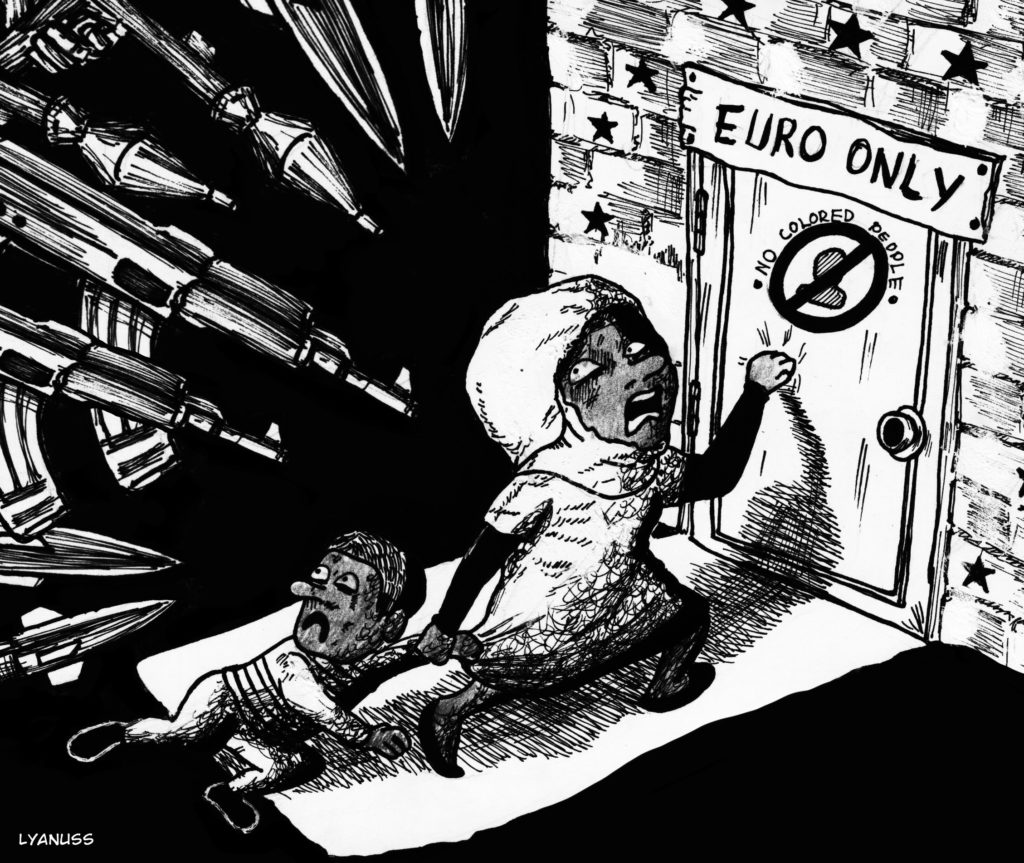by the Weekly Sillimanian | March 10, 2022

Unless you have been living under a rock, you most likely have heard of news centered on Russia’s war on Ukraine. What is not as focused on, however, is the treatment non-white refugees face when they are just trying to seek asylum and survive the situation. According to reports from several outlets, like the New York Times and ABC News just to name a few, colored people deal with double standards while trying to flee Ukraine. For example, they are segregated from white Ukrainians, while getting access to food and transportation only after everyone else.
All of this sounds too familiar, and that is because this issue did not just start recently. The Philippines, although geographically remote from the current war, has also been rampant with its own discrimination towards indigenous people (IP) in the country.
The Weekly Sillimanian outrightly condemns this continuing discrimination of the IPs. We have been known in the international community as a welcoming country, with refugees throughout history flocking to the Philippines to find shelter from tensions at home. But we are yet to develop this open arms personality to our very own people belonging to the minority.
We appreciate the national government for opening its arms to asylum seekers displaced by the conflict. However, we just wish it has the same level of willingness when it comes to supporting our own IP brothers and sisters. For decades, perhaps even centuries, IPs have been marginalized and left to fend for themselves when it comes to accessing food, financial support, education, and more.
The minority groups who represent roughly more than 15% of the Philippines’ total population still face discrimination despite having laws in the land that safeguard their rights, like the Indigenous Peoples Rights Act of 1997, as well as the security of their rights that is written in our constitution.
Additionally, we have noticed that our view on IPs is not in the most positive light. This is evident in the fact that the names of tribes have been used with negative connotations. When we see someone acting inappropriately, we say phrases like “Undangi na. Mura ka’g Badjao. [Stop that. You are like a Badjao.]”, further drilling the mentality that IP people are of lesser value than those who are not.
This is exactly evidence of how the IPs face exclusion in an ironically, open country that has, as was aforementioned, hosted a number of refugees throughout history. According to the United Nations Development Programme, the IPs of the Philippines have been facing historical discrimination and marginalization from political processes and economic benefits.
We believe that this continuing mindset of marginalization is partly attributed to the assertion of our popular culture. We have been immersed with foreign culture throughout the years that we are forgetting our very own roots. The IPs, who represent our unscathed culture, became a representation of our heritage rather than of our own timeless identity. While we are proud to be with them to showcase the very culture that our country has, Filipinos tend to leave them as they are, part of a minority who are often looked at with discrimination. We are so glued with foreign influence that we tend to look at our own culture with indifference.
The continuing secession and armed conflicts, particularly in Mindanao, have further threatened the stability and security of the affected IPs, therefore putting them in a more difficult situation. The red-tagging of Lumads has also been detrimental to these people’s ability to obtain education and the right to freedom. Rather than implementing programs for capacity-building of the IPs, they find themselves stuck between armed struggles and some have even been tagged as terrorists.
The Philippines has been fighting insurgencies for more than 40 years, yet the threat still looms and it especially affects the minorities, whose ancestral lands are often made into hotspot areas due to the presence of armed groups. Aside from urbanization, these pressing problems have been one of the reasons why many of these IPs are displaced, with some coming into urban areas where they find no certainty for a secure life.
The government should give more importance to these IPs, and create a grassroots-level program for them to be able to obtain a livelihood, as well as producing professionals for them to be more productive not just to themselves but to the nation as well. Many indigenous people are already making a mark nationally, particularly in the field of leadership. These talents and skills should be given their spotlight and let these become amplifiers of the minority’s voices.
The Philippines has been an international figure in terms of opening its doors to those who need refuge. The government’s decision to welcome Ukrainian refugees to the country further cemented the nation’s reputation as a welcoming one. But we often put our own indigenous peoples out of the picture when we get this recognition. Yet, with this continuing issue, can we still stand by our brand as a nation of open arms, well behind the international scene?
Eradicating this mentality and supporting these minority groups now is not too late. We urge the national government to continue its support for the people of Ukraine while developing programs to help improve our indigenous groups’ quality of life.


